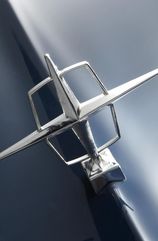.
Henry M. Leland: Difference between revisions
Red marquis (talk | contribs) No edit summary |
Red marquis (talk | contribs) mNo edit summary |
||
| (3 intermediate revisions by the same user not shown) | |||
| Line 1: | Line 1: | ||
'''Henry M. Leland''' ( | '''Henry M. Leland''' (16 February, 1843 - 26 March, 1932) (born Barton, Vermont, died Detroit, Michigan) was a machinist, inventor, engineer and automotive entrepreneur. | ||
He learned precision engineering and manufacturing in the firearms industry, where ultrafine tolerances were required. He applied this expertise to the nascent motor industry as early as | He learned precision engineering and manufacturing in the firearms industry, where ultrafine tolerances were required. He applied this expertise to the nascent motor industry as early as 1870 as a principal in the machine shop Leland & Faulconer, and later was a supplier of engines to [[Ransom E. Olds]]'s company, [[Oldsmobile]]. He also invented the electric barber clippers, and for a short time produced a unique toy train, the Leland-Detroit Monorail. | ||
He offered an engine to the directors of the [[Henry Ford Company]] when [[Henry Ford]] left in | He offered an engine to the directors of the [[Henry Ford Company]] when [[Henry Ford]] left in 1902. The directors were impressed and decided to build a car with this motor in the Ford-designed chassis, and the company was recreated as [[Cadillac|Cadillac]]. | ||
At Cadillac, Leland pioneered many modern manufacturing processes, including the use of interchangeable, replaceable parts that could be manufactured by machine shops. This apparently independent extension of a principle credited to | At Cadillac, Leland pioneered many modern manufacturing processes, including the use of interchangeable, replaceable parts that could be manufactured by machine shops. This apparently independent extension of a principle credited to Eli Whitney allowed automobiles to be repaired by independent garages and owners. | ||
Leland sold Cadillac to [[General Motors Corporation|General Motors]] on July 29, | Leland sold Cadillac to [[General Motors Corporation|General Motors]] on July 29, 1909 for $5.6 million but remained as an executive until 1917. He left in dispute over the company's involvement in the war effort and formed the [[Lincoln|Lincoln]] Motor Company to build Liberty aircraft engines. After the war, the company's factories were retooled to manufacture luxury automobiles. | ||
In | In 1922 Lincoln became insolvent and was bought out by [[Henry Ford]]'s [[Ford Motor Company]]. The Lincoln brand continues to be Ford's flagship luxury line today. | ||
==See Also== | |||
{{Lincoln}} | |||
==External links== | ==External links== | ||
| Line 20: | Line 23: | ||
[[Category:Automotive engineers|Leland, Henry]] | [[Category:Automotive engineers|Leland, Henry]] | ||
[[Category:Automotive | [[Category:Automotive company founders|Leland, Henry]] | ||
[[Category:Ford | [[Category:Ford|Leland, Henry]] | ||
[[Category:General Motors executives|Leland, Henry]] | [[Category:General Motors executives|Leland, Henry]] | ||
Latest revision as of 16:19, 7 August 2009
Henry M. Leland (16 February, 1843 - 26 March, 1932) (born Barton, Vermont, died Detroit, Michigan) was a machinist, inventor, engineer and automotive entrepreneur.
He learned precision engineering and manufacturing in the firearms industry, where ultrafine tolerances were required. He applied this expertise to the nascent motor industry as early as 1870 as a principal in the machine shop Leland & Faulconer, and later was a supplier of engines to Ransom E. Olds's company, Oldsmobile. He also invented the electric barber clippers, and for a short time produced a unique toy train, the Leland-Detroit Monorail.
He offered an engine to the directors of the Henry Ford Company when Henry Ford left in 1902. The directors were impressed and decided to build a car with this motor in the Ford-designed chassis, and the company was recreated as Cadillac.
At Cadillac, Leland pioneered many modern manufacturing processes, including the use of interchangeable, replaceable parts that could be manufactured by machine shops. This apparently independent extension of a principle credited to Eli Whitney allowed automobiles to be repaired by independent garages and owners.
Leland sold Cadillac to General Motors on July 29, 1909 for $5.6 million but remained as an executive until 1917. He left in dispute over the company's involvement in the war effort and formed the Lincoln Motor Company to build Liberty aircraft engines. After the war, the company's factories were retooled to manufacture luxury automobiles.
In 1922 Lincoln became insolvent and was bought out by Henry Ford's Ford Motor Company. The Lincoln brand continues to be Ford's flagship luxury line today.
See Also

| ||
| LINCOLN | ||
|
Ford | Mercury | Lincoln | Mazda | Edsel | Continental | Merkur Current Models: Town Car · Navigator · MKZ · MKX · MKS · MKT Historic Models: Zephyr · Blackwood · LS · Versailles · Continental · Premiere · Cosmopolitan · Mark series · Mark LT · Lido Concept Cars: MKR · MKS · Futura · Mk9/Mark X · Navicross · L2K · Fifty-X · Continental Concept · Mark 9 · MKT Concept · C Concept · Machete Concept One-Offs: Lincoln-Mercury · Continental · Continental Mark II · SYNC · MyLincoln Touch | ||
| Henry M. Leland | Corporate website | A brand of the Ford PAG |
